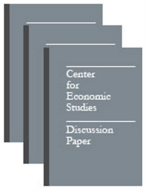Has Toughness of Local Competition Declined?
Has Toughness of Local Competition Declined?
Abstract
Recent evidence on firm-level markups and concentration raises a concern that market competition has declined in the U.S. over the last few decades. Since measuring competition is difficult, methodologies used to arrive at these findings have merits but also raise technical concerns which question the validity of these results. Given the significance of documenting how competition has changed, I contribute to this literature by studying a different measure of competition. Specifically, I estimate the toughness of local competition over time. To derive this estimate, I use a generalized monopolistic competition model with variable markups. This model generates insights that allows me to measure competition as the sensitivity of weighted-average markup to changes in the number of competitors using directly observable variables. Compared to firm-level markups estimation, this method relaxes the need to estimate production functions. I then use confidential Census data to estimate toughness of local competition from 1997 to 2016, which shows that local competition has decreased in non tradable industries on average in the U.S. during this time period.
Others in Series
Working Paper
Working Paper
Working Paper




